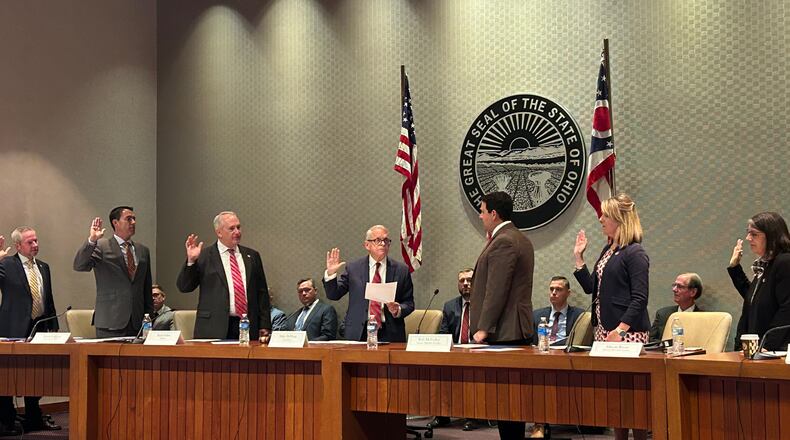“It’s unfortunate we can’t get to work on behalf of the people of Ohio because of Republican infighting,” said Senate Minority Leader Nickie Antonio, D-Lakewood. “The Ohio Redistricting Commission is no place to play out a proxy war for the next Republican House speaker.”
“The Republican-controlled commission has had more than 16 months to prepare for this. They have no one else to blame but themselves for this needless delay,” said House Minority Leader Allison Russo, D-Upper Arlington.
Original report:
A behind-the-scenes disagreement among Republican leadership caused a false start Wednesday for Ohio’s Redistricting Commission, which met under court order to create a semi-permanent fix to the state’s unconstitutional state legislative districts ahead of the 2024 elections.
Despite full attendance from the five Republicans and two Democrats on the commission Wednesday morning, the meeting didn’t begin for over an hour after its scheduled start time. Eventually, Ohio Gov. Mike DeWine told the press that the delay was caused behind the scenes.
“We just don’t have an agreement between the House and Senate Republicans about who their chair should be,” DeWine said.
The disagreement ultimately caused DeWine to suspend the meeting and push it back to Friday morning at 8 a.m., assuming Republican leadership notifies DeWine that they are ready to name their co-chair by end of the day Thursday. This shortens an already tight timeframe to create legislative maps, which Ohio Secretary of State Frank LaRose said need to be done by Sept. 22 to give the state’s local boards of elections ample time to prepare for the March primary.
Despite LaRose’s request, Democrats on the board say they’re not willing to rush the process. Senate Minority Leader Nickie Antonio, D-Lakewood, and House Minority Leader Allison Russo, D-Upper Arlington, both said they’re aiming to have maps passed around mid-October, providing ample time for citizens to weigh in on the process.
Last time the Ohio Redistricting Commission tried to draw maps In 2021 and early 2022, the effort dragged on for months as the commission passed state legislative maps five times, each of which were struck down by the Supreme Court of Ohio for being unconstitutionally gerrymandered.
A federal court finally ordered the state to use the last proposed maps — despite them being ruled unconstitutional by the state court — in 2022 only. Those are the current legislative boundaries the commission has now one week to rectify.
Each time the Ohio Redistricting Commission is formed, Republicans and Democrats each choose one member of the board to be co-chair, who takes point on negotiations on behalf of the party. Last time, Republican leadership agreed on a House having a co-chair. This time around, under different leadership, there was no such agreement between Senate President Matt Huffman and Speaker Jason Stephens heading into the meeting.
“As far as the Senate is concerned, we’d like to see the Senate have its opportunity to co-chair given that the House was co-chairing the last time but, again, that’s just our preference. The Speaker and the President are the ones who have to come up with the conclusion,” said Sen. Rob McColley, R-Napoleon, who was sworn onto the commission Wednesday morning.
As things stand, McColley, who served on the board last time around, would be vying for co-chair with Rep. Jeff LaRe, R-Violet Twp., who had a brief stint as co-chair in the commission’s last iteration.
“It is imperative members of the commission operate in good faith with the shared goal of delivering strong representation for the people of Ohio,” LaRe said.
Republican infighting has not been unusual since House Speaker Jason Stephens, R-Kitts Hill, was elected to the speaker’s chair with support from House Democrats and a minority of House Republicans. Stephens has said he struck no deal with Democrats on issues like redistricting to get their support.
Jen Miller, executive director for the League of Women Voters of Ohio, an organization that has continued litigation against the state’s congressional and state legislative districts, said the delay and the events that preceded it show that politicians shouldn’t be trusted with map-making power.
Miller also said that the delay showed that the Ohio Redistricting Commission wasn’t controlled by its board members. “Clearly, they were calling others that were in charge,” she said.


